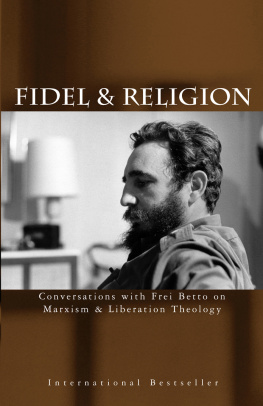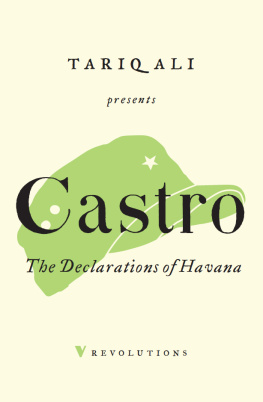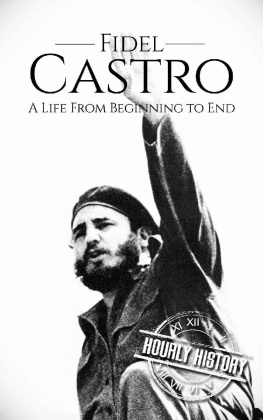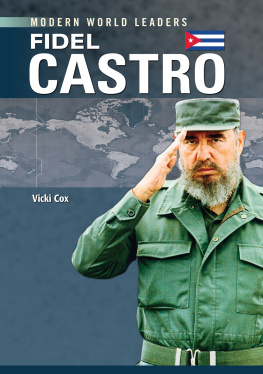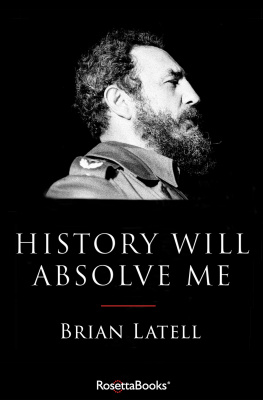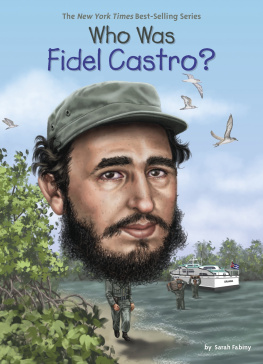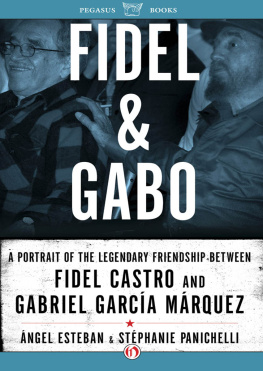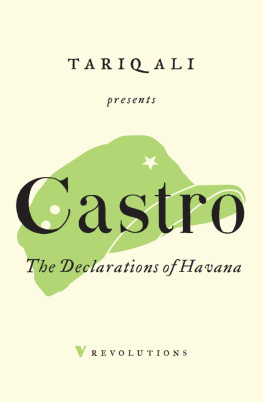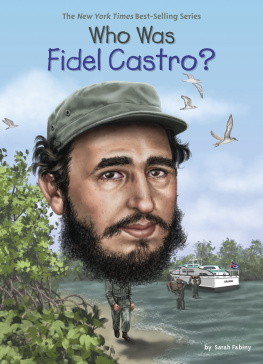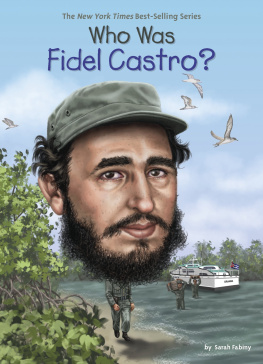Fidel has his own special way of fusing himself with the people, [which] can be appreciated only by seeing him in action. At the great public mass meetings one can observe something like the dialogue of two tuning forks whose vibrations interact, producing new sounds. Fidel and the
mass begin to vibrate together in a dialogue of growing
intensity until they reach a climax in an abrupt conclusion
crowned by our cry of struggle and victory.
Che Guevara, 1965
FIDEL
CASTRO
READER
FIDEL
CASTRO
READER
EDITED BY
DAVID DEUTSCHMANN
AND DEBORAH SHNOOKAL

| Ocean Press www.oceanbooks.com.au |
Cover design and original cover image by David Alfonso, Copyright 2008
Copyright 2008 Fidel Castro
Copyright 2008 Ocean Press
All rights reserved. No part of this publication may be reproduced, stored in a retrieval system or transmitted in any form or by any means, electronic, mechanical, photocopying, recording or otherwise, without the prior permission of the publisher.
ISBN 978-1-921700-86-6 e-book
Library of Congress Catalog Card Number 2007928210
First edition 2008
PUBLISHED BY OCEAN PRESS
PO Box 1015, North Melbourne, Victoria 3051, Australia
E-mail:

| www.oceanbooks.com.au
|
CONTENTS
Fidel Castro Ruz was born in Birn, in the former province of Oriente, on August 13, 1926. Born into a well-off landowning family, he received his primary education in a rural school, later attended private Jesuit schools in Santiago de Cuba and Havana, and graduated from law school at the University of Havana.
While at university, he joined a student group against political corruption. He was a member of the Cuban Peoples Party (also known as the Orthodox Party) in 1947 and became a leader of its left wing. That same year, he volunteered for an armed expedition against the Trujillo dictatorship in the Dominican Republic (the expeditionaries were unable to leave Cuba to carry out their plans). As a student leader, Fidel Castro was in Colombia to help organize a Latin American anti-imperialist student congress and participated in the April 1948 popular uprising in Bogot.
After Fulgencio Batistas coup dtat of March 10, 1952, Fidel Castro began to organize a revolutionary organization to initiate armed insurrection against the US-backed Batista dictatorship. He organized and led an unsuccessful attack on the Moncada army garrison in Santiago de Cuba on July 26, 1953, for which he and over two dozen others were captured, tried, found guilty, and imprisoned; more than 60 revolutionaries were murdered by Batistas army during and immediately after the Moncada attack. While in prison, Fidel Castro edited his defense speech from the trial into the pamphlet History Will Absolve Me, which was distributed in tens of thousands of copies and became the program of what was to become the July 26 Movement. Originally sentenced to 15 years, he and his comrades were released from prison 22 months later, in May 1955, as a result of a growing public campaign.
On July 7, 1955, Fidel Castro left for Mexico, where he began to organize a guerrilla expedition to Cuba to launch the armed insurrection. On December 2, 1956, along with 81 other fighters, including his brother Ral, Che Guevara, Camilo Cienfuegos, Juan Almeida and Jess Montan, Fidel reached the Cuban coast aboard the cabin cruiser Granma. For the next two years, Fidel Castro directed the operations of the Rebel Army, in addition to continuing as central leader of the July 26 Movement. After an initial setback, the guerrillas were able to reorganize their forces and by late 1958 had successfully extended the struggle from the Sierra Maestra mountains to the heart of the island.
On January 1, 1959, Batista fled Cuba. In response to a call by Fidel, hundreds of thousands of Cubans launched an insurrectionary general strike that ensured the victory of the revolution. Fidel Castro arrived triumphantly in Havana on January 8 as commander-in-chief of Cubas victorious Rebel Army. On February 13, 1959, he was named prime minister, a position he held until December 1976, when he became president of the Council of State and the Council of Ministers.
He has been first secretary of the Central Committee of the Cuban Communist Party since its founding in 1965.
On July 31, 2006, shortly before his 80th birthday, Fidel Castro temporarily handed over all his positions in the Cuban government and Communist Party to his brother Ral, minister of defense and first vicepresident of the Council of State.
Addressing the Millennium Summit at the United Nations in September 2000, Fidel Castro playfully put a handkerchief over the little warning light that was illuminated to advise the speaker when their five minutes were up.
This incident highlights the dilemma faced by the editors of this book: How can a selection be made of the words of one of historys greatest orators, encompassing five decades of speeches? Many of Fidel Castros single speeches alone would fill an entire book. And how can a selection be made to truly represent all the ideas and issues he has articulated during half a century on the world political stage?
There are more than 5,000 speeches over a 48-year period, in addition to countless interviews and political statements of one sort or another. The selection published here is quite different from the initial selection made when this editorial project was first conceived. Undoubtedly, the contents of this volume would have been quite different if selected five years before or five years hence, as it would inevitably be shaped by the circumstances of the moment, as this selection is. The editors of this volume acknowledge that the present selection is partly framed by two considerations: firstly, the dramatic changes in the political landscape in Latin America in the first decade of the 21st century, and secondly, the ongoing consequences of the crisis of socialism and the debate over the future of the socialist project.
These events over the last decade especially and Fidels decision to temporarily hand over power to his brother Ral in July 2006 have influenced our choice of speeches. Nevertheless, we are confident it is both representative of Fidels political thinking and reflective of the process of the Cuban revolution itself.
There are 20 chapters and an epilogue in this volume, encompassing some 28 separate speeches and interventions. Some of these are printed in full, others are excerpted. For this volume, we have included several speeches addressed to audiences outside Cuba.
A comprehensive chronology will also guide readers through the history of the periods reflected in this anthology.
A selection such as this must inevitably exclude some if not many of Fidels classic speeches made at key moments of the revolution. It also neglects in part a number of important themes he has returned to over the years, such as Cubas involvement in Africa, the Third World debt crisis and the environmental disaster threatening humanity.
Special mention needs to be made of a parallel publishing project to this anthology. Ocean Presss sister publisher, Ocean Sura new Latin American book publisher with several offices in the continenthas embarked on an ambitious project to publish a series of thematic selections of Fidel Castros speeches, interviews and writings in order to make these works available in Spanish to readers in Latin America and elsewhere. This will include multi-volume anthologies of Fidel Castro on culture and education, Latin America, Chile during the Allende era, Venezuela and Chvez, political portraits of world and historical figures, socialism, political economy, Africa and solidarity.
Next page

